Businesses are using big data analytics for all kinds of purposes, from helping to improve operational processes to discovering market insights. However, with the growing threat of cyberattacks, many are turning to analytics to help protect their systems and comply with regulations. Here, we’ll take a close look at what security analytics is and how it can benefit businesses.
Security analytics an overview
Like all forms of data analytics, security analytics involves the collection and aggregation of a wide range of data from numerous sources. The purpose, however, is to analyse this data to discover vulnerabilities and threats to the security of a company’s systems and data. Data can be gathered from firewalls, routers, network traffic, antivirus software, OS event logs, business apps, cloud resources, ID verification and access management logs and endpoint data. It also uses employee and user behaviour data and third-party threat intelligence information. This is then analysed using specially developed security algorithms which seek out patterns and sequences that give insights into potential, emerging or existing threats.
Modern cybersecurity analytics tools also employ AI and machine learning, which enables them to learn from past experiences to continually improve their ongoing threat detection. So, as new threats evolve, they will be able to detect these too. Of crucial importance is that this is done in real-time so that threats can be dealt with proactively and stopped before an attack inflicts damage.
Ways in which security analytics can be used
Security analytics can be used for a wide range of measures. It can detect links in network traffic activities which signify the emergence of a potential attack. It can discover attackers threatening to infiltrate a system’s endpoints, such as its laptops and mobile phones. It identifies vulnerable, compromised or prohibitively shared user accounts. It blocks unfamiliar communications channels, preventing data being copied, downloaded or transferred without authorisation. It can also safeguard against identity theft by stopping users from sending their details to other sites.
Security analytics can even be used to protect against internal threats; monitoring employee activity to identify intentional or negligent behaviours which put the system’s security at risk. It does this by employing algorithms that uncover suspicious actions which indicate threats or vulnerabilities.
Compliance is another area in which security analytics can play an important role. Here, it can help automate compliance requirements, such as the gathering of log data, the management of data networks and the monitoring of data actions, enabling the company to compile reports and detect users not working in compliance with internal IT policies. Where incidents occur, security analytics can also assist in any forensic investigation, unearthing the activities and sources of the related events.
The benefits of using security analytics
The chief benefit of using security analytics is that, aside from detecting threats and potential security breaches, it also alerts the company when these incidents are likely to happen and before they actually do. In this way, its insights enable the company to be proactive in its security.
With threats coming from a wide range of sources, such as hacking, malware, ransomware, phishing, internal sabotage and negligence, and with cybercriminals using far more sophisticated tools, some of which also make use of AI and machine learning, many companies can see real value in security analytics.
Security in the cloud
For companies using cloud-based systems, it is possible that your vendor already provides a wide range of robust security measures to protect your systems from cybercrime. Here at eukhost, for example, our cloud servers are protected with enterprise-class security. We work in partnership with Fortinet to offer next-gen FortiGate firewalls which feature intrusion prevention and inflow virus protection systems that detect and isolate threats before they reach your server.
In addition, we provide extensive VPN features, DDoS protection, email security, SSL certificates, email signing certificates and more. For added peace of mind, we also provide the industry-leading Veeam backup solution, designed for cloud infrastructures. It features virtual machine backups, replication and encryption which keep your data secure in case of system failure, data corruption, bad updates, ransomware or human error.
When it comes to compliance, the security we provide helps companies meet regulations such as GDPR and PCI DSS. With regard to the latter, all our cloud servers are PCI compliance capable and we can provide the server environment required for this purpose.
Conclusion
As threats become increasingly more advanced, it is good to know that technologies to protect IT systems, such as security analytics, are being developed and deployed to combat them. The best place to host such big data analytics, of course, is in the cloud. It’s reassuring, therefore, that the cloud, itself, already comes with a range of robust security measures to protect you, whether you use security analytics or not.
For more information, visit our cloud hosting or enterprise hosting pages.



